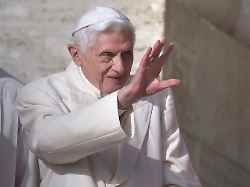Open questions about the funeral
How are things after the death of Benedict XVI? further?
12/31/2022, 1:11 p.m
Pope Benedict XVI In 2013, he became the first pope to step down from office in more than 700 years. His death does not result in a vacancy in the chair, and official business does not have to be regulated. There is now initial information on how believers from Benedict XVI. can say goodbye.
“It is with sadness that I inform you that Pope Emeritus Benedict XVI died at 9:34 a.m. today in the Mater Ecclesiae Monastery in the Vatican,” the Vatican announced on New Year’s Eve morning: Benedict XVI, born Jospeh Ratzinger, is dead. Over the Christmas holidays the 95-year-old’s health had deteriorated rapidly. The incumbent Pope Francis said at his general audience that his predecessor was “very ill”. What follows the death of Benedict, who was elected Pope in 2005 and who resigned from office in 2013 as the first pope in over 700 years, is still largely unclear.
Ingo Brüggenjürgen, editor-in-chief of Cologne Cathedral Radio, sees an “exceptional situation”: “There is no script for the funeral of resigned popes,” Brüggenjürgen told ntv. One thing is clear: the body of the German Pope Emeritus will be laid out in St. Peter’s Basilica from next Monday. The believers will be given the opportunity to get away from Benedict XVI. to say goodbye, who was elected on April 19, 2005 as Cardinal Joseph Ratzinger as the 265th Pope. The Vatican would like to provide information about the location and course of the funeral and other ceremonies.
The Benedict biographer Peter Seewald declared in 2020 that the retired Pope would like a burial in the former grave of his predecessor John Paul II in St. Peter’s Basilica. After John Paul’s beatification in 2011, his body was reburied in a chapel in the aisle of St. Peter’s Basilica. This means that Ratzinger is not buried at the side of his brother Georg, with whom he was very close until his death. Georg Ratzinger, who died in July 2020, was buried in Regensburg near the family’s home.
Pope Emeritus Benedict, who was already in poor health at the time, surprisingly traveled to Regensburg again a few days before the death of his older brother to say goodbye. He was no longer able to attend the funeral service. Instead, his private secretary Georg Gänswein read a letter from Benedikt in which he thanked him “for allowing me to be with him again in the last days of his life.”
No successor search necessary
There is no struggle to succeed Benedict after his death: the first German to sit on the Holy See in almost 500 years resigned his office in February 2013 – only the second pope in the millennia-old history of the papacy. On March 13, 2013, the second day of their conclave and in the 5th ballot, 115 cardinals elected Argentine Jorge Mario Bergoglio as Benedict’s successor. Since then, as Pope Francis, Bergoglio has been the head of around 1.2 billion Catholics. As a result, the numerous processes that have been established over the centuries are not automatically applied – most of them relate to a phase of the vacancy of the Sede, in which the continuation of official business, including the enthronement of a new pope, is to be regulated.
Brüggenjürgen assumes that rituals and ceremonies are held in a similar way to those of popes who died in office. That will be “mainly decided by Pope Francis, he has direct responsibility. There will certainly be a big liturgy celebration and I could imagine that Pope Francis will not miss the opportunity to preside over it himself.” The Vatican has since confirmed: The funeral service for Benedict will take place on January 5th in St. Peter’s Square and will be led by the incumbent Pope Francis – an unprecedented event in the two thousand year history of the Catholic Church, which came about as a result of Benedict’s historic resignation.
According to police estimates, around 300,000 people crowded onto St. Peter’s Square during the funeral service for Benedict’s predecessor, the charismatic John Paul II. Since Benedict XVI. did not hold office for as long and was not as popular as his predecessor and he did not die in office, the number of participants is likely to be somewhat lower. Most recently, allegations once again overshadowed the work of the former Pope: A report on sexual abuse presented in Munich accused Benedict of making serious mistakes in dealing with a pedophile priest during his time as Archbishop of Munich.
